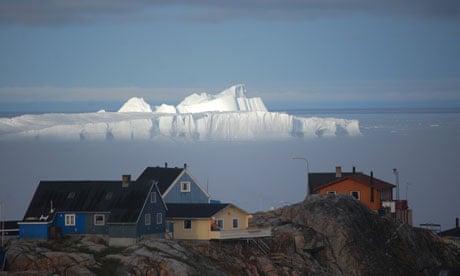The European Union has clashed with Greenland and other Arctic nations over their perceived failure to ensure wider international stewardship over the far north.
Diana Wallis, the vice-president of the EU, said she could see "people on the streets" protesting if this fragile environment was not seen to be safeguarded properly.
In response, a Greenland foreign minister accused European countries of "panic reactions" in pushing for a deep-water drilling ban after the BP disaster in the Gulf of Mexico.
At a workshop under the aegis of Nato held at Cambridge University, Wallis said she was bored by continuing talk rather than immediate action over wider participation in the Arctic Council.
"It's got to be widened out. If we don't do things then people will take to the streets to make sure something is done over climate change," she argued.
The Arctic Council is largely made up of nations with coastal regions surrounding the north pole, such as Russia, Norway and Greenland. The council is charged with protecting the environment.
Interest in the far north has escalated in recent years since the ice cap started to melt under the impact of global warming. The thaw has triggered a new race for resources with oil companies starting to drill off Greenland, Alaska and elsewhere.
Cairn Energy has increased the excitement off Greenland by announcing two new oil and gas "shows" over the last month.
But with the BP blowout in the Gulf of Mexico fresh in people's minds, the EU has been pressing for new deep-water drilling bans which could hit Greenland. Inuuteq Holm Olsen, Greenland deputy foreign minister, told the same Cambridge workshop that he feared "green" concerns were being used by Europe to exercise control over oil operations in his country.
"We welcome focus and attention on environmental issues … What we don't welcome is the notion that there should not be any industrial development in the name of environmental protection. What the rest of you have been benefiting from should not be denied to us in the Arctic."
Holm Olsen said a recent German proposal to the Ospar environmental protection treaty was "a not very well thought-out proposal to ban deep-sea drilling which would include north-east Greenland." Greenland and some other Arctic Council members are suspicious that the EU is using the "green" card in an attempt to muscle in on the growing strategic importance of the far north.
But some academics at the Nato workshop also argued that the Arctic Council was being run as a cosy club for the self-interest of big powers such as Russia. Other delegates at the Nato research workshop dismissed as "media hype" the idea that the new interest in oil, diamonds and fisheries was causing the potential for some kind of new Cold War.
Paul Berkman, from the Scott Polar Institute in Cambridge which was hosting the workshop, said: "In this region, the cold war has never gone away."

Comments (…)
Sign in or create your Guardian account to join the discussion